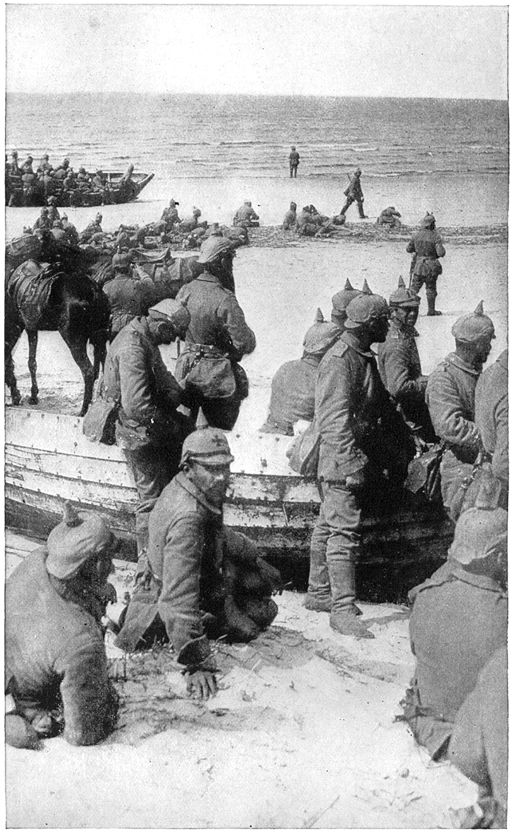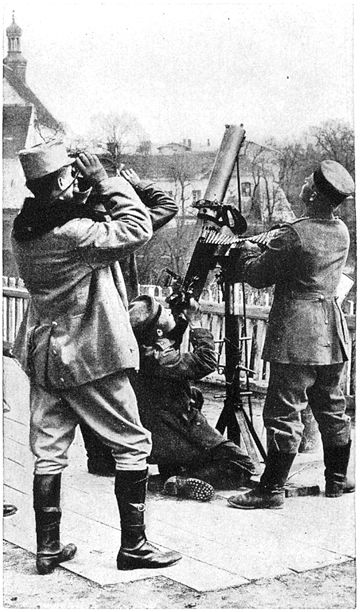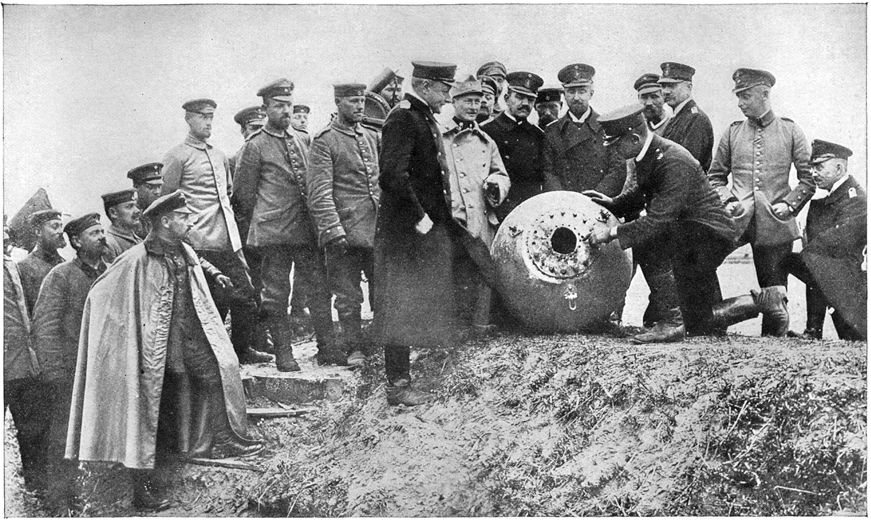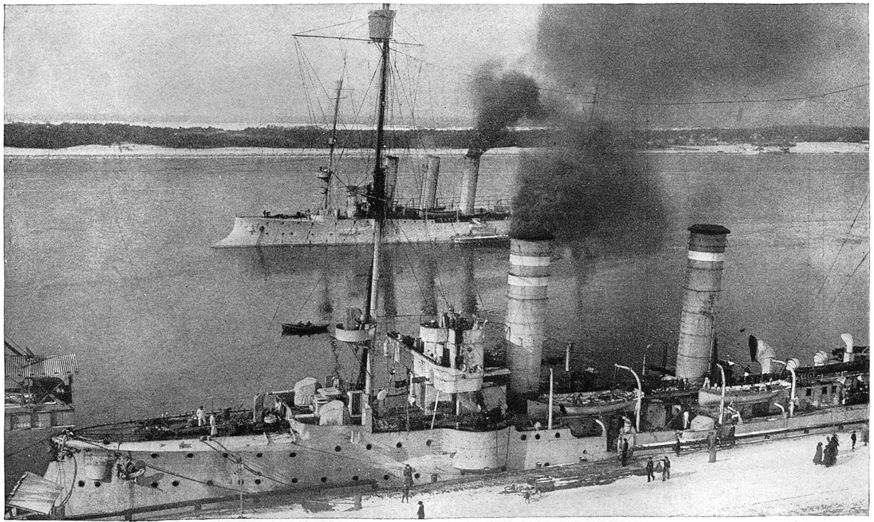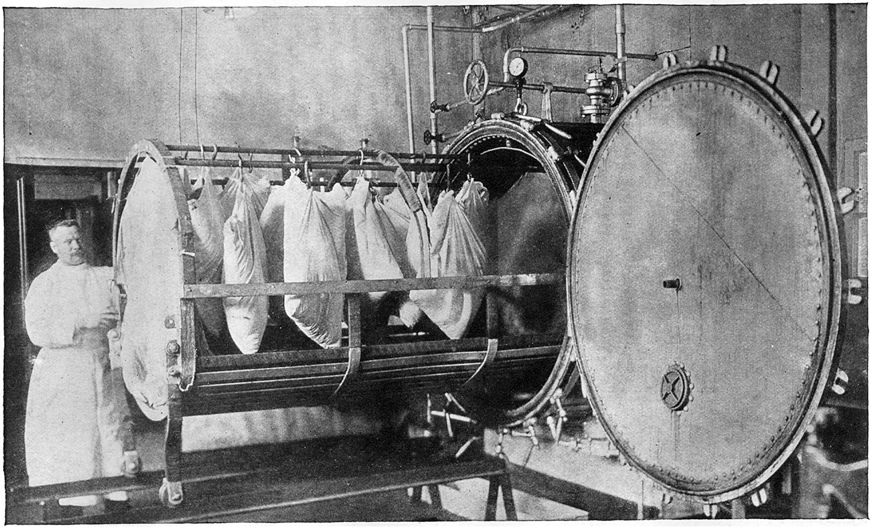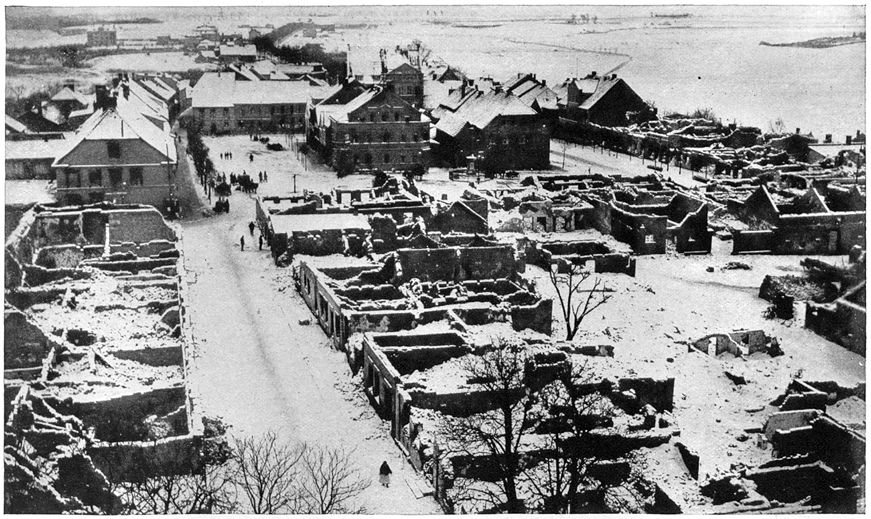|
|||||||||||||||||
|
|
<< Previous | Contents | Next >> CHAPTER III Russian MobilizationThe first month of the war in the West had coincided more nearly with German plans than with Entente hopes, but both Germany and the Western Allies agreed in miscalculating Russia. The great Moltke had remarked early in his career that Russia had a habit of appearing too late on the field and then coming too strong. The war was to prove that to be a fault of democracy rather than of autocrats, and Russia intervened with an unexpected promptitude which was to be followed in time by an equally unexpected collapse. The forecasting of the course of wars is commonly left to military experts, and military experts commonly err through ignoring the moral and political factors which determine the weight and distribution of military forces. The soldier, so far as he looks behind armies at all, only looks to the numbers from which those armies may be recruited, and pays scant regard to the political, moral, social, and economic conditions which may make havoc of armies, evoke them where they do not exist, or transfer them to unforeseen scales in the military balance. Russia appeared to the strategist as a vast reservoir of food for powder which would take time to mobilize, but prove almost irresistible if it were given time. Both these calculations proved fallacious, and still less was it foreseen that the reservoir would revolt. The first misjudgment deranged the German plans, the second those of the Allies, while the third upset the minds of the world.
The outbreak of war found Russia with a peace-strength of over a million men, a war-strength of four millions, and reserves which were limited not by her population but by her capacity for transport, organization, and production of munitions. Her Prussian frontiers were guarded by no natural defences, but neither were Prussia's. Nature, it has been said, did not foresee Prussia; Prussia is the work of men's hands. Nor had Nature foreseen Russia, and men's hands had not made up the deficiency. Mechanical means had remedied the natural defects of Prussia's frontier, but not those of the Russian; and Russia's defence consisted mainly in distance, mud, and lack of communications. The value of these varied, of course, with the seasons, and the motor-transport, which atoned to some extent for the lack of railways, told in favour of German science and industry, and against the backward Russians. Apart from the absence of natural defences, the Russian frontier had been artificially drawn so as to make her Polish province an indefensible salient, though properly organized it would have been an almost intolerable threat alike to East Prussia and to Austrian Galicia. But for her preoccupation in the West, Germany could have conquered Poland in a fortnight, and Russian plans, indeed, contemplated a withdrawal as far as the line of Brest-Litovsk. As it was, the German offensive in Belgium and France left the defence of Prussia to the chances of an Austrian offensive against Lublin, a containing army of some 200,000 first-line and 300,000 second-line troops, and the delays in Russian mobilization.
Two of these proved to be broken reeds. Russian troops were almost as prompt in invading East Prussia as German troops in crossing the frontiers of France and Belgium, and by the end of the first week in August a flight to Berlin had begun. The shortest way from the Russian frontier to Berlin was by Posen, and it lay through a country peopled with Poles who were bitterly hostile to their German masters. But it was impossible to exploit these advantages at the expense of deepening the Polish salient with its already too narrow base, and the flanks in East Prussia and Galicia had first to be cleared. Under the supreme command of the Grand Duke Nicholas, who in spite of his rank was a competent professional soldier, and the more immediate direction of Rennenkampf, one of the few Russian officers to emerge with enchanced reputation from the Japanese War, the Russians proceed to concentrate on East Prussia (see Map). On the east Gumbinnen was captured after a battle on the 20th, and the important junction of Insterburg occupied by Rennenkampf, while on the south Samsonov on the 21st turned the German right, threatened Allenstein and drove the fugitives, as Rennenkampf had done, into the lines of Königsberg. East Prussia lay at Russia's feet, and something like a panic alarmed Berlin. The Teutonic cause was faring even worse in Galicia and Poland. Austria had a million troops in Galicia, but her offensive under Dankl towards Lublin only produced a strategic Russia retirement, while Ruszky and Brussilov overran the eastern borders and menaced Lemberg.
Fortunately for the Germans their own right hand proved a stronger defence. The incompetent General von François, who had been driven into Königsberg, was superseded by Hindenburg, a retired veteran of nearly seventy, whose military career had made so slight an impression on the German mind that his name was not even included in the German "Who's Who." Nevertheless he had commanded corps on the Prussian frontier, and even after his retirement made the study of its defence his hobby. He knew every yard of the intricate mixture of land and water which made up the district of the Masurian Lakes, and had, unfortunately for Russia, defeated a German financial scheme for draining the country and turning it into land over which an invader could safely march. Within five days of Samsonov's victory, Hindenburg, taking advantage of the magnificent system of German strategic railways, had collected some 150,000 men from the fortresses on the Vistula and concentrated them on a strong position stretching from near Allenstein south-west towards Soldau, his left resting on the railway from Eylau to Insterburg and his right on that from Eylau to Warsaw. In front of him were marshes with the ways through which he was, but Samsonov was not, familiar; and the railways enabled him to threaten either of the enemy's flanks.
Samsonov was practically isolated. Rightly ignoring the strong defences of Königsberg but wrongly getting out of touch with Rennenkampf, he had pushed on, thinking there could be no serious resistance east of the Vistula and hoping to seize the bridge at Graudenz. Hindenburg made a feint on his right, but pushed his real outflanking movement along the railway on his left. But the feint was enough to outflank Samsonov's left and close the retreat towards Warsaw. It also diverted his reserves from his centre and from his right, which on the 27th was cut off from a possible junction with Rennenkampf. A gallant attempt by Gourko to relieve him on the 30th came too late. The only exit was along a narrow strip of land between the marshes leading to Ortelsburg, and here between the 28th and the 31st the Russian forces were almost annihilated. Less than a third escaped, and the loss of guns was even greater. Over eighty thousand prisoners were taken, and the Germans who had missed their Sedan in the West secured a passable imitation in the East. Samsonov perished in the retreat. The Russian censorship suppressed the news, and what was allowed to come through from Germany was treated in Entente countries as a German lie. For more than a fortnight little was known of a victory which, save for Allenby's four years later, was the completest in the war. The relief in Berlin was immense; Hindenburg became the popular idol, Field-Marshal, and Generalissimo of the Teutonic armies in the East; and a little village, which lay behind Hindenburg's centre, was selected to give its name to the battle and to commemorate a national revenge for that defeat at Tannenberg five centuries before when the Slavonic kingdom of Poland had broken the power of the Teutonic Order in Prussia.
Russia, however, was a different power from the Teutonic Order, and Austrian generals were not Hindenburgs; Ruszky and Brussilov, too, were better leaders than Samsonov, and though Rennenkampf had to evacuate East Prussia before Hindenburg's advance, the Austrians were driven like chaff before their enemies in Galicia. The object of Russian strategy was to straighten the serpentine line of the frontier for military purposes. Hence, while pushing forward her wings in East Prussia and Galicia, she would merely stand on guard or withdraw in the Polish centre, and the Germans encountered little opposition when they seized Czenstochowa and Kalisch and pushed towards the Warta, or the Austrians when they advanced by Zamosc towards the Bug. The advance in East Prussia was also represented as a chivalrous attempt to reduce the pressure in France by a threat to Berlin, and the real Russian effort was the sweep westwards from the eastern Galician frontier, where the Second Russian army under Ruszky and the Third farther south under Brussilov were already threatening the envelopment of Lemberg (or Lwow [Footnote: Pronounced and sometimes spelt Lvoff.]) and the Austrians under Von Auffenberg. Ruszky, formerly like Foch a professor in a military academy, was perhaps the most scientific of Russian generals; Brussilov showed his strategy two years later at Luck; [Footnote: Pronounced Lutsk: the Slavonic "c" = "ts" "cz" = "ch" and "sz" = "sh."] and Radko Dmitrieff was a Bulgarian general, now in Russian service, who in the Balkan wars had won the battle of Kirk Kilisse and helped to win that of Lule-Burgas. There was not an abler trio in any field of the war.
By the end of August Brussilov had captured Tarnopol and Halicz and forced the successive rivers which guarded the right flank of Lemberg and Von Auffenberg's forces and protected their communications with the Carpathian passes; and on 1 September the battle for the capital of eastern Galicia began. It lasted for nearly three days, and was almost as decisive as that of Tannenberg. Brussilov's outflanking movement was continued with success, but the coup de grâce was given here, as at Charleroi and the Marne, by isolating a central group and thus breaking the line. Thrusting forward his right, Ruszky outflanked Lemberg and interposed between Von Auffenberg and the Austrian army in Poland. On the 3rd Lemberg was evacuated, and the retreat, which was for a time protected by the entrenched camp at Grodek, gradually became more disorderly. Over 70,000 prisoners were taken, mostly, no doubt, Czecho-Slovaks and Jugo-Slavs who had more sympathy with the Russians than with their Teutonic masters, and masses of machine guns and artillery. The victory was brilliantly and promptly followed up. While Brussilov pressed on to Stryj and the Carpathians, Ruszky and Dmitrieff beat Von Auffenberg again at Rawa Ruska near the frontier on the 10th, and Ivanoff, who had taken command in Poland, drove Dankl and the Archduke Joseph Ferdinand from the line they held between Lublin and the borders. The whole of the Austrian forces fell back behind the Vistula and the San, Von Auffenberg finding safety in Przemysl, and others a more temporary refuge at Jaroslav, while the van of the retreating army did not stop short of Cracow. The German detachments in Poland had to conform, and by the middle of September Poland had been cleared as far as the Warta, and Galicia was defenceless, save for invested Przemysl, as far south as the Carpathians and as far west as the Dunajec. The days of the Marne were even more sombre for the Central Empires on the Vistula and the San. Their gloom was relieved by the halo which shone round Hindenburg's head. Rennenkampf was gone and all the faculties of the University of Königsberg conferred degrees on the victor to celebrate its escape. Reinforcements were sent to the frontier, and on 7 September Russia was invaded. The object of the offensive is not clear except on the assumption that Hindenburg's strategic acumen was defective, and that he thought he could turn the Russian right by an advance across the Niemen. But the difficulties were insuperable and the distances were vast. Even if he got to Kovno it would need far greater forces than he possessed to cover and control the illimitable land beyond; and between him and success lay swamps more extensive then the Masurian Lakes and the heavily fortified line of the Narew. He was, indeed, in his turn falling into Samsonov's error, and seems to have been saved from his fate mainly by the prematurely successful Russian defence. He was allowed to reach the Niemen at various points between Kovno and Grodno, but was unhappily prevented from committing his fortunes to the eastern bank by the Russian artillery, which repeatedly destroyed his pontoons as soon as they were constructed. Lower down on his right an attempt on the fortress of Ossowiec proved equally futile, because the Germans could find no ground within range solid enough to bear the weight of their artillery. The inevitable retreat began on the 27th, and it was sadly harassed by the pursuing Russians, especially in the forest of Augustowo, where Rennenkampf claimed to have inflicted losses amounting to 60,000 men in killed, prisoners, and wounded. By 1 October the Russian cavalry was again across the German frontier, and Hindenburg was called south to attempt in Poland to frustrate the Russian advance on Cracow which his turning movement in the north had failed to check.
The call was urgent, for the conquest of Galicia portended disaster to the Central Empires. Cracow was a key both to Berlin and Vienna; its possession would turn the Oder and open the door to Silesia, which was hardly less vital to Germany than Westphalia as a mining and manufacturing district. It would also give access to Vienna and facilitate the separation of Hungary, and all that that meant in the Balkans, from the Teutonic alliance. Even without the loss of Cracow, that of the rest of Galicia was serious enough; her oil-wells were the main sources of the German supply of petroleum, and her Slav population, once assured of the solidity of Russian success, would throw off its allegiance to the Hapsburgs and entice the Czecho-Slovaks on its borders to do the same. These prospects were not visionary in September 1914. Jaroslav fell on the 23rd and Przemysl was invested. Russian cavalry rode through the Carpathian passes into the Hungarian plain, and west of the San patrols penetrated within a hundred miles of Cracow. In her own interests as well as in those of her ally, Germany was compelled to throw more of her weight against the Russian front. The German and Austrian commands were unified under Hindenburg, and having failed on the north he now tried to stop the Russians by a blow at their centre in Poland. Here Ruszky was now in command, while Ivanoff with Brussilov and Dmitrieff as his two lieutenants controlled the armies in Galicia. Like every German general Hindenburg believed in the offensive being the best form of defence, and like all Germans in the advantage of waging war in the enemy's country. His plan of attack was a concentric advance on Warsaw along the three railway lines leading from Thorn, Kalisch, and Czenstochowa, combined with an effort to cross the Vistula at Josefow while the Austrians kept step in Galicia, relieved Przemysl, and recovered Lemberg. There was even a movement southwards from East Prussia which captured Mlawa, but it was only a raid which did not hamper the Grand Duke's contemplated counter-offensive. Warsaw had obvious attractions; Josefow was selected because it was far from Russia's railway lines but near to Ostrowiec, the terminus of a line which led from the German frontier; and the object of crossing the Vistula was to take in the rear the great fortress of Ivangorod lower down, and then to get behind Warsaw. The Grand Duke had divined these intentions, while he concealed his own by misleading the Germans into a belief that he proposed abandoning the Polish salient and retiring on Brest. His real plan was to stand on the east bank of the Vistula save for the defence of Warsaw which lies upon the west, and to counter-attack round the north of the German left wing under the guns of the great fortress of Novo Georgievsk. Rennenkampf was brought down to command this movement, while Ruszky took charge of the defence at Josefow. On 10 October Hindenburg's centre moved out from Lodz and on the 15th the battle was joined all along the Vistula. Warsaw was vigorously defended by Siberian and Caucasian troops, aided by Japanese guns. The battle raged from the 16th to the 19th, when the planned surprise from Novo Georgievsk forced back the German left and threatened the centre before Warsaw. Ruszky was still more successful with his stratagem at Josefow. The Germans were suffered to construct their pontoons, cross the river, and make for the railway between Warsaw and Lublin. Then on the 21st the Russians came down upon them with a bayonet charge, and not a man is said to have escaped across the river. Next day the Russians also crossed at Novo Alexandria lower down, and a general attack drove the Germans back to Radom on the 25th and thence from Kielce on 3 November. Threatened by Rennenkampf on the north and Ruszky on the south, the German centre had to abandon Skierniewíce, Lowicz, and then Lodz, destroying every vestige of communication as they withdrew and lavishly sacrificing men in rearguard actions to protect their stores and their equipment. Ironically enough the chief success of Hindenburg's offensive was achieved by the Austrian subordinates he had come to help. Ivanoff was a bad substitute for Ruszky, and Dankl temporarily retrieved the reputation he had lost the previous month. Jaroslav was recovered, Przemysl was relieved and abundantly revictualled for a second and a longer siege, and an attack on Sambor bade fair to put the Austrians once more in Lemberg. But the German defeat in Poland compelled an Austrian retreat in Galicia. Przemysl was reinvested and the Russians resumed their march with quickened pace on Cracow. This time they threatened it first from the north of the Vistula, and on 9 November their cavalry, pursuing the Germans, was at Miechow, only twenty miles from Cracow. Moving more slowly through Galicia while Brussilov occupied the Carpathian passes, Dmitrieff pushed his cavalry into Wielitza south-east of the city on 6 December, and on the 8th he fought a successful action in its outskirts. Farther north the Cossacks had occupied Nieszawa, a few miles from Thorn, on 9 November, and on the following day a Russian raid across the Silesian frontier cut the German railway from Posen to Cracow. It was high time that the Germans turned the weight of their offensive from the Flanders front and the Channel ports to parrying the Russian menace on their East. Austria was in no happier case. Her invasion of Serbia which had opened the flood-gates of war had been almost submerged in the torrent, and the punitive expedition she had planned had brought punishment mainly upon herself, and that not merely at the hands of Serbia's powerful patron, but at those of the little people who were to be chastised. The early fighting was of a desultory character, and Austria's two first-line corps having been withdrawn to meet the Russians, the Serbs and Montenegrins made a combined effort on 12 August to invade Bosnia and capture Serajevo. No great progress was made, and on the 16th the Austrians retaliated with the capture of Shabatz in the north-west corner of Serbia. But next day the Serbs routed a large Austrian force in the neighbourhood, and the Crown Prince Alexander followed up this victory by another on the 18th against the Austrians on the Jadar, who were seeking, in co-operation with those at Shabatz, to cut the Serbs off from their base. The result was that by the 24th the Austrians were practically cleared out of the country, and Vienna announced that the punitive expedition, which had cost 40,000 casualties and fifty guns, had accomplished its object. A second attempt to achieve it was, however, provoked by the invasion of Bosnia with which the Serbs had supplemented their victory, and by their capture of Semlin in order to stop the Austrian bombardment of Belgrade. On 8 September the Austrians launched an attack across the Drina which forms the boundary between Serbia and Bosnia, and the battle raged till the 17th. Again the Serbs were victorious, though they made no impression on Serajevo and the Austrians retained a foothold on the eastern bank of the Drina; and for six weeks Serbia was left in comparative peace. But at the end of October the entrance of Turkey into the war and the relief afforded to Austria's troops farther north by the increasing activity of Germany in Poland and Galicia encouraged another effort; and under General Potiorek the Austrians began a more ambitious campaign. The Serbian frontier constituted a sharp salient which was indefensible against a superior force, and the Austrians exploited this advantage by extending their front of attack from Semendria on the Danube right round to Ushitza beyond the Drina. Their object was to envelop the Serbs and seize, firstly, Valievo, their advanced base, secondly, Kraguievatz the Serbian arsenal, and, finally, Nish, to which the Serbian Court and Government had withdrawn. The only chance the Serbs had of success was to shorten their line by withdrawing to the semicircular mountain ridge which lies south and south-east of Valievo, and even so their prospects were gloomy. Two wars had already depleted Serbia's manhood and her munitions, and her numbers were sadly inferior to the Austrians. But individually her troops were far better fighters than their opponents, and the Crown Prince, Marshal Putnik, and General Míshitch, the commander of the 1st Serbian Army, quite outclassed Potiorek in tactics, strategy, and knowledge of the terrain. By 10 November the Austrians were in Valievo, and Potiorek was inclined to rest on his laurels. For a fatal fortnight he did nothing, and even detached three of his corps to serve in the Carpathians against the Russians who were there doing Serbia the service they had done in East Prussia to the Allies on the Marne. In that interval Greek and other munitions were conveyed in spite of Bulgar and Turkish intervention to the hard-pressed Serbians; King Peter, old, blind, and deaf, came from Nish to make a stirring appeal to his troops; and when on 1-3 December Potiorek once more advanced to the ridges of Rudnik and Maljen, he encountered a re-munitioned army, skilfully posted in strong positions and pledged to death or victory. Victory was its guerdon all along the line; the Austrian left centre and centre were broken on the 5th; at night their right was shattered near Ushitza; and on the morrow the whole army was in retreat, which soon became a rout. There were 80,000 casualties before, on the 15th, the fugitives were back in their own land across the Drina, the Danube, and the Save, leaving Belgrade once more in the hands of the heroic Serbs. Austria had, however, acquired a strange new friend in the Turk, who had thrice besieged Vienna, and with whom she had waged an intermittent warfare of the Crescent and the Cross for some four centuries; and the blood-stained hand of Turkey was stretched out to save its "natural allies"--to quote Bernhardi--at Buda-Pesth and Potsdam. There was, indeed, a bond of sympathy, for in each of the enemy capitals a ruling caste oppressed one or more subject nationalities. Prussia stood for the Junker domination of the German tribes; Austria, for Teutonic government of Czechs, Slovaks, and Poles; Hungary, for Magyar dictation to Jugo-Slavs and Rumanes; and Turkey, for the exploitation or extermination of Armenians, Greeks, and Arabs. The Young Turk, who had dispossessed Abdul Hamid in 1908, only differed from the Old in being more efficient and less of a gentleman, and in seeking his inspiration from Krupp's guns and Treitschke's philosophy instead of from the Koran. He was a Turk without the Turk's excuse, and the adventurer Enver, who inaugurated the rule of the Committee of Union and Progress by assassinating his rivals, was willing to give Germany control of the Berlin-Baghdad route in return for a free hand with the subject nationalities of the Ottoman Empire. Russia was the common obstacle to both ambitions; but, Russia finally crippled, the Balkan States would become Turco-Teutonic provinces, and the Near East a German avenue into Asia, while Egypt might be recovered for the Sultan and made a base for German penetration of Africa. Millions of German money had already been invested in this scheme, and the Kaiser's versatile piety had assumed a Mohammedan hue in the East. He had proclaimed himself the friend of every Mohammedan under the sun, and had carefully refrained from wounding the feelings of the authors of the Armenian massacres. The defeat of his Turkish friends in the Balkan Wars had been almost as great a blow to him as to them, and he had seen in the subsequent discord of the victors a chance of crushing them all. Rumania, he thought, was tied to his chariot-wheels by its Hohenzollern king, and Greece by its Hohenzollern queen; and Bulgaria could be won through its hatred of the successful Serbs. Serbia conquered, the corridor would be complete; but Serbia could not be permanently crushed while Russia remained intact, and Turkey would be a useful ally in the Russian campaign. There were millions of Mohammedans under Russian rule, and a Turkish invasion of the Caucasus, even if it did not stimulate insurrection in Russia, would keep hundreds of thousands of Russian troops from East Prussia, Poland, or Galicia. Apart from the vulgar bribes which affected the Young Turk politicians there were other motives to move the populace. A Jehad against the Christian might stir the honest fanatic; well-to-do Turks had invested some of their savings in two Turkish Dreadnoughts under construction in England which the British Government had commandeered; and two German warships, the Goeben and the Breslau, had arrived at the Golden Horn to impress or to encourage the Ottoman mind. Such were some of the straws which finally broke the back of sober resistance to the warlike gamble of Enver and Talaat; but the substantial argument was the chance which was offered for Turkey to get back some of what her inveterate Russian enemy had seized in the course of a century and her inveterate British friend had pocketed as the price of her protection. On 29 October a horde of Bedouins invaded the Sinai Peninsula while Turkish torpedo boats raided Odessa, and on 1 November the British ambassador departed from Constantinople. The two Central Empires had enlisted their first ally, and the war had taken another stride towards Armageddon. << Previous | Contents | Next >> |
|
|||||||||||||||
|
|
|||||||||||||||||

